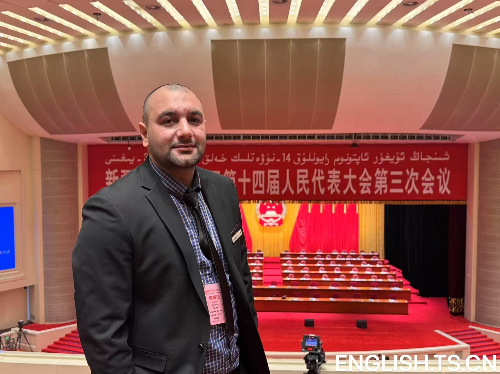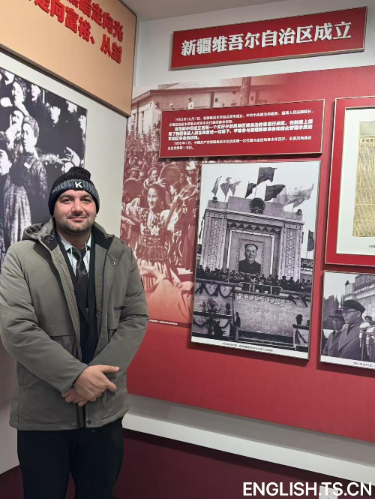I sat in on Xinjiang’s regional “two sessions” in 2025 in Urumqi, northwest China’s Xinjiang Uygur Autonomous Region. The “two sessions” focused on the region's development and budget allocation, with a particular emphasis on showcasing the progress made in recent years. The organizers invited foreign students and reporters to witness firsthand the positive changes that have taken place in Xinjiang.

Najeeb Ullah at the venue of the third session of the 14th People's Congress of the Xinjiang Uygur Autonomous Region at the Xinjiang People's Hall in Urumqi, northwest China's Xinjiang Uygur Autonomous Region.
The “two sessions” began with a series of presentations by government officials and experts, highlighting the significant strides made in various sectors. Economic development was a key theme, with presentations detailing the growth of industries such as agriculture, manufacturing, and tourism. Infrastructure projects were also emphasized, including the expansion of transportation networks and the modernization of urban areas.
To complement the presentations, the organizers arranged visits to several key sites in Xinjiang. These included modern factories, agricultural cooperatives, and cultural landmarks. The aim was to provide tangible evidence of the region's transformation and to illustrate the positive impact of government policies on the lives of ordinary people.

Najeeb Ullah at the exhibition on counter-terrorism and deradicalization in Xinjiang in Urumqi, northwest China's Xinjiang Uygur Autonomous Region.
One of the most striking aspects of the “two sessions” was the emphasis on social stability and harmony. Officials repeatedly stressed the importance of maintaining peace and unity among the various ethnic groups in Xinjiang. They highlighted the government's efforts to promote cultural exchange and understanding, as well as addressing the concerns of minority communities.
The “two sessions” also addressed the challenges that Xinjiang faces, such as poverty and environmental issues. Nonetheless, the overall tone was optimistic, with officials expressing confidence in the region's ability to overcome these obstacles and achieve sustainable development.
The presence of foreign students and reporters added a unique dimension to the regional “two sessions”. These individuals were able to provide fresh perspectives on the issues discussed and ask insightful questions about the region's development. Their participation also served to enhance the international visibility of Xinjiang and promote a more nuanced understanding of the region.
The regional “two sessions” in Xinjiang provided a comprehensive overview of the region's progress and its future prospects. The organizers effectively conveyed the message that Xinjiang is a dynamic and developing region with a bright future. The participation of foreign students and reporters added a valuable international perspective to the event, contributing to a more informed and nuanced understanding of Xinjiang's development.
Najeeb Ullah is an international student from Pakistan studying at Xinjiang Medical University.
Producer: Xiao Chunfei
Supervisors: Ding Tao and Jie Wenjin
Planners: Jie Wenjin and Cheng Li
Reviewers: Cheng Li and Hou Weili
Editors: Gvlzar Mijit and Fan Zixuan









